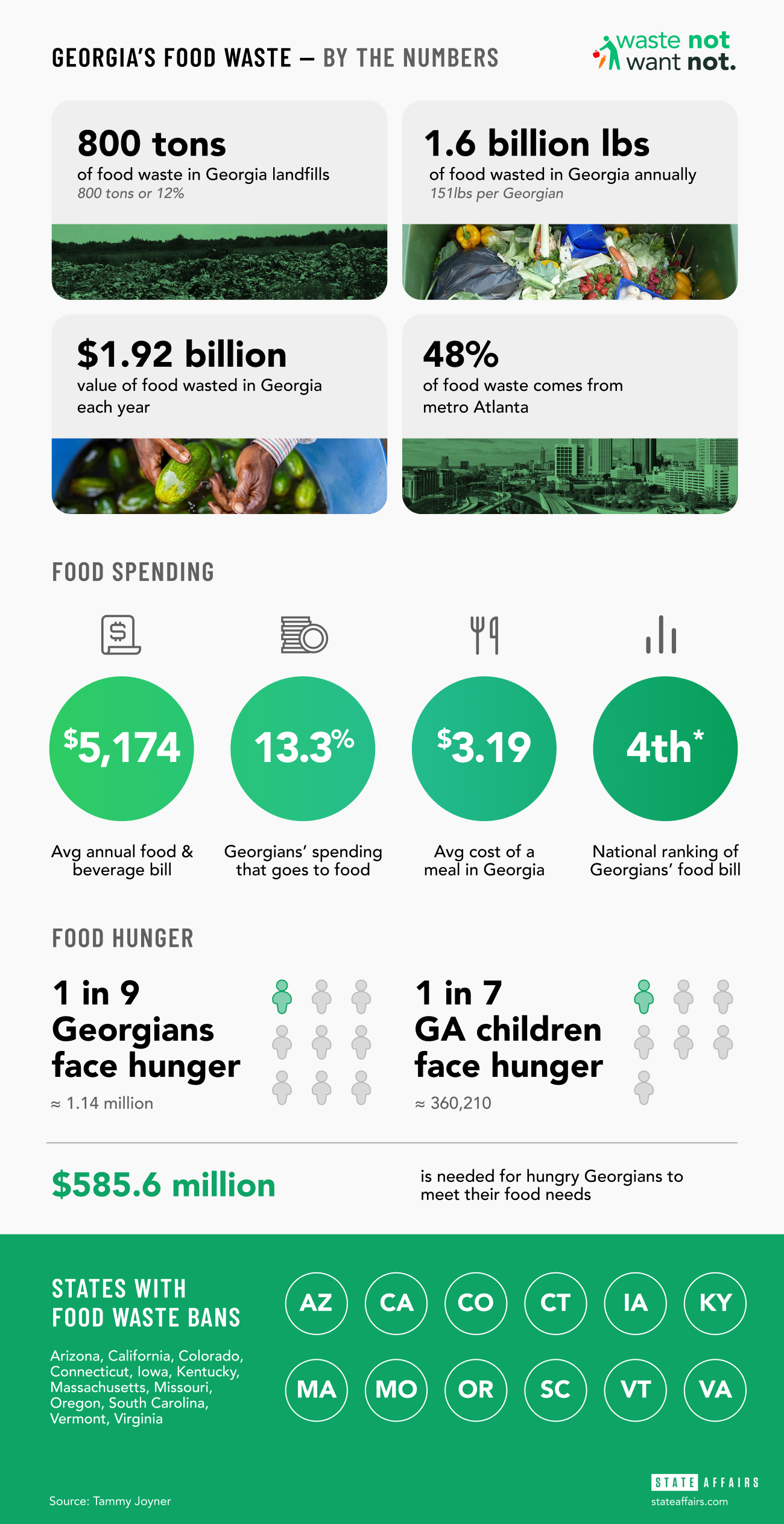Stay ahead of the curve as a political insider with deep policy analysis, daily briefings and policy-shaping tools.
Request a DemoGeorgians waste billions of pounds of food annually while people go hungry, and the state does little

Composting by bojanstory for Getty Images
This is Part 1 of a series that looks at the amount of food waste in Georgia and how the state, once at the forefront of the waste issue, has failed to regulate it.
ATLANTA — Over the next two months, food will be uppermost in the minds of most Georgians as they head into the high-holiday season of Thanksgiving, Christmas and Hanukkah.
While many will enjoy turkey and other holiday food traditions — albeit at higher prices than last year, more than a million Georgians will go hungry or struggle to find affordable and nutritious food.
Amid the festivities is a sobering reality: A good bit of the food prepared or available this holiday season won’t make it to the table. A large amount will end up in state landfills.
Some 1.6 billion pounds of food – or 151 pounds per Georgian – is wasted in the state annually, according to Science for Georgia. To put it in perspective, the amount of food wasted by Georgians is 10 times the weight of the Washington Monument.

Wasted food includes food from retail stores, plate waste, uneaten prepared food, kitchen trimmings from restaurants, cafeterias and homes, and byproducts from food and beverage processing plants.
“If food waste were a country, it would be the world’s largest polluter, producing as much as 10 percent of global emissions,” according to Drawdown Georgia, a statewide initiative for “scaling Georgia-specific climate solutions.”
“And as food goes to waste, many people around the world — including right here in Georgia — are food insecure,” officials at Drawdown Georgia say.
Roughly half of the state’s wasted food comes from metro Atlanta, according to the state’s Environmental Protection Division, which also notes on its website that food residuals represent the “largest single category of solid waste going into Georgia’s landfills.”
At issue is the fact that while Georgia residents spend the fourth-highest amount on food nationally, most of that food goes to waste when 1 in 9 adults in the state or 1.14 million people and 1 in 7 children go hungry each year. Wasted food in Georgia amounts to nearly $2 billion, according to Science for Georgia.
Despite such data, Georgia has failed to regulate food waste like neighboring South Carolina and 11 other states.
“[We] don’t necessarily regulate or even have requirements that are reported to the state,” said Keith Stevens, solid waste permitting manager for the EPD. “So municipal solid waste landfills that accept food residuals, and other household trash, are essentially permitted to accept any non-hazardous waste.”
Stevens oversees Georgia’s 92 landfill facilities. Of those, 40 are solid waste landfills that accept food and household trash and waste.
In Georgia, responsibility for collecting, recycling and disposing of wasted food is left mostly to cities, counties, private disposal companies, and nonprofit food recovery or sustainability organizations or programs.
Determining exactly how much food currently goes into the state’s landfills is complicated, says Stevens. The state has not produced a study since 2005. But Stevens estimates that 25% of the waste stream in Georgia’s solid waste landfills is food and food residuals.
It’s not just a Georgia problem
Nationally, Americans throw away more than 40 million tons of food each year. That waste occupies more space in U.S. landfills than many other materials, and has tripled since the 1960s, officials at the U.S. Environmental Protection Administration note. As the food rots, it produces greenhouse gases equal to 37 million cars.
Such chilling environmental consequences have prompted some states to enact legislation that includes tax incentives, liability protection for donations, improving date labels on food and food waste bans.

Last year, lawmakers across 18 states introduced 52 bills involving food waste management, according to the National Conference of State Legislatures. Most states, including Georgia, adhere to federal legislation, such as the Bill Emerson Good Samaritan Food Donation Act. A dozen states have gone further by enacting food waste laws. Georgia is not among them. At least eight states require food to be diverted from landfills. Georgia does not.
Little has been done at the state level in Georgia in terms of widespread policies and programs since state officials closed the Office of Environmental Management more than a decade ago, according to one waste expert. The office was part of the state’s Department of Community Affairs (DCA).
The closing was due to “a combination [of reasons],” Athens-Clarke County’s Solid Waste Director Suki Janssen told State Affairs. “There were folks who didn’t want to do any solid waste plans anymore. There were no plans to review anymore and then there was no solid waste diversion or solid waste reduction goals anymore.
“Once the state stopped requiring that 25% [overall solid waste] diversion goal and once they stopped requiring solid waste management plans to be reviewed that kind of started the erosion of that office,” added Janssen who should know. She is a former employee of the now-defunct office, which was closed during Gov. Nathan Deal’s tenure.
Georgia’s last comprehensive statewide inventory of its food waste was in 2004 when food waste accounted for 12% of the materials going into state landfills. Today, that percentage is estimated to have more than doubled.
The state’s website dealing specifically with food waste matters uses data from a Georgia Statewide Waste Characterization study, released in 2005.
An unexpected about-face
Years of inaction by the state in overseeing food waste and disposal is a far cry from when Georgia was considered a leader in the southeast in the disposal of “food scraps,” the term most widely used in the sustainability industry. The state kept diligent tabs on the type and amount of food scraps statewide and even parceled out grants to aid in properly disposing the waste.
Justin Vining, spokesman for DCA, told State Affairs the department “was unable to comment” on the issue.
“The state has been absent from waste reduction conversations for over 10 years,” Janssen said. “They got rid of the office [Office of Environmental Management] which did a lot of proactive grants and had a waste reduction goal at that time. That’s all gone.
“They pretty much took away all the funding for waste reduction activities in a big way when they got rid of the office,” added Janssen, former president of the Georgia chapter of the Solid Waste Association of North America.
An October 2021 report on state food waste policies done by the Harvard Law School Food Law and Policy Clinic found that Georgia has weak or no policies in 8 of 10 key areas it examined.
The report said, for example, that Georgia’s Environmental Protection Division offers resources for composting and food residual diversions to residents, but Georgia has no organic waste bans or waste recycling laws dealing with food waste.
The federal government provides tax deductions to entice businesses to donate food but Georgia offers no additional tax incentives beyond the federal incentives, according to a report, which was done on behalf of the National Resources Defense Council (NRDC), an international non-profit environmental advocacy group.
It also noted that the city of Atlanta has a food systems plan but no such regional or statewide plans exist in Georgia.
“North and South Carolina have staff members at the state level that actually are responsible for technical assistance for local governments,” Janssen noted. “They’ve had grants they’ve passed through or created state funds so that people could start composting programs.
“They actually make the communities report back their waste diversion activities,” she added. “Those two states have reporting requirements that help hold local governments accountable.”
In South Carolina, the Department of Health and Environmental Control and the commerce department oversee the state’s Don’t Waste Food SC campaign. The campaign’s goal is to cut food waste in half by 2030.
Meanwhile, the Georgia official responsible for dealing with wasted food is settling into the newly-created job within the Georgia EPD.

A restart or retrenchment?
Lena Chambless became manager of EPD’s Recovered Materials and Abatement Program in August. Chambless, whose main duty, for now, is administering permits for composting, declined to comment on food waste in the state, noting in an email that she would not “be the best point of contact” to answer the question of how much food Georgians waste.
Nonetheless, Chambless said: “Georgia EPD works primarily in the compost permitting space of organics waste diversion in a regulatory space.
“Since we work as a regulatory agency, the state does not have any cost associated with food waste disposal. Likewise, EPD does not have any data on the percentages of food waste composition compared to other materials sent to landfill.”
“They pretty much took away all the funding for waste reduction activities in a big way when they got rid of the office.”
Suki Janssen, Solid Waste Director for Athens-Clarke County
Asked if there was one central office in the state government that keeps data on food waste for all 159 counties, Chambless said: “Sadly, we have not had a characterization study done since 2004. So some folks choose to base that [food waste data] on the national numbers. Obviously, it’s not ideal but that’s what we have right now.”
There are signs Georgia is starting to pay attention again.
The state recently announced it would be distributing about $2 million in grants to be used for any type of waste diversion or reduction activity. Some 42 entities seeking a total of more than $10 million applied. The grants are slated to be awarded in December.
“This is huge because some grants are earmarked just for traditional recycling or carts,” Janssen said. “This one is for anything and several of us around the state are going for food scrap collection infrastructure.”
If awarded, Janssen’s Athens solid waste operations plans to use the grant “for a truck that will pick up more food scraps.”
“Our truck we have currently is too small,” she said. “Food scrap material is very dense and water heavy so it takes a truck that can hold several tons of material.”
What the state has now is a big opportunity, according to Blair Beasley, director of climate strategies at Ray C. Anderson Foundation, which works with Drawdown Georgia.
“At the same time that we have food that is edible and not being eaten, we also have people in our community who are in need of food or are food insecure,” said Beasley. “So the goal is to connect to those in our communities who are in need of food with edible food that will be wasted otherwise, and then to try to keep food that is not suitable for human consumption out of landfills through options like composting.”
Want to participate in the conversation? Share your thoughts on social media:
Twitter @STATEAFFAIRSGA
Facebook @STATEAFFAIRSUS
Instagram@STATEAFFAIRSGA
LinkedIn @STATEAFFAIRS
Contact Tammy Joyner at [email protected] or on Twitter @LVJOYNER.
Header image: Food waste composting (Credit: bojanstory for Getty Images)
Gov. Kemp calls on state agencies to be fiscally restrained amid record $16.5B surplus
The Gist Gov. Brian Kemp asked the state’s 51 government agencies for continued fiscal restraint when drafting their amended fiscal year 2025 and 2026 budgets. Most agencies adhered to his request even as the state’s general fund surplus hit a record $16.5 billion last month. Forty-five agencies, excluding state courts, followed the governor’s instructions to …
Georgia defies bomb threats as election chief declares a “free, fair and fast” vote amid record turnout
ATLANTA – Despite dealing with over 60 bomb threats, Georgia’s election chief said Tuesday the state’s general election went smoothly. Georgia had a record turnout with nearly 5.3 million people voting, Secretary of State Brad Raffensperger told reporters. Election officials in the state’s 159 counties have until 5 p.m. to certify votes. “We had a …
In the (state)house: Meet the newest members of the Georgia legislature
When lawmakers reconvene at the state Capitol on Jan. 13, there’ll be a cadre of new faces in the 236-member Georgia General Assembly, one of the nation’s largest state legislatures. All 236 statehouse seats were up for election this year. Most candidates ran unopposed. Incumbents in contested races easily kept their seats, with the exception …
2 young Democrats win Statehouse seats as Republicans hold majority
ATLANTA — Many Statehouse incumbents appeared to beat back challengers Tuesday, ensuring their return to the Capitol in January. Republicans retain control of the House and Senate. Two Generation Z candidates will join the 236-member Legislature as new members of the House of Representatives: Democrats Bryce Berry and Gabriel Sanchez. Berry, a 22-year-old Atlanta middle …




